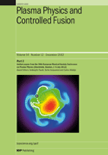
PLASMA PHYSICS AND CONTROLLED FUSION
Scope & Guideline
Pioneering Research for a Sustainable Energy Future
Introduction
Aims and Scopes
- Fusion Plasma Dynamics and Stability:
Research focuses on understanding the dynamics of plasmas in various confinement configurations, particularly in tokamaks and stellarators, including stability analysis and the impact of different magnetic configurations. - Plasma Diagnostics and Measurement Techniques:
Innovative diagnostic methods for measuring plasma parameters are a core area, including techniques such as Thomson scattering, charge exchange recombination spectroscopy, and advanced imaging systems for real-time analysis. - Magnetic Confinement and Control Systems:
The journal emphasizes the development of control systems to manage plasma stability and confinement, including real-time feedback mechanisms and predictive modeling for disruption avoidance. - Modeling and Simulation of Plasma Behavior:
Extensive use of computational models to simulate plasma behavior under various conditions, including gyrokinetic simulations and MHD (magnetohydrodynamic) simulations, to predict plasma performance and dynamics. - Interfacial Physics and Material Interactions:
Studies on plasma-material interactions, including erosion and deposition processes, are crucial for developing materials that can withstand the harsh conditions in fusion reactors. - Advanced Fusion Concepts and Technologies:
Exploration of advanced concepts beyond conventional tokamaks, including spherical tokamaks, inertial confinement, and alternative fusion methods, alongside their technological implications.
Trending and Emerging
- Machine Learning and Data-Driven Approaches:
An increasing number of publications are utilizing machine learning techniques for predictive modeling, diagnostics, and optimization in plasma physics, highlighting a trend towards integrating AI with traditional plasma research. - Advanced Diagnostic Techniques:
There is a significant uptick in research dedicated to the development and application of advanced diagnostic tools that provide deeper insights into plasma behavior, including high-resolution imaging and real-time monitoring systems. - Integrated Modeling of Fusion Systems:
The trend towards integrated modeling approaches that encompass core, pedestal, and scrape-off layer physics is gaining momentum, reflecting a holistic view of plasma confinement and performance. - Plasma-Material Interactions:
Research focusing on the interactions between plasma and materials, particularly in the context of heat loads and erosion in fusion devices, is emerging as a critical area of study due to its implications for reactor design. - Exploration of Novel Fusion Concepts:
There is growing interest in alternative fusion concepts and configurations, including spherical tokamaks and hybrid systems, as researchers seek innovative pathways to achieve practical fusion energy.
Declining or Waning
- Basic Plasma Physics:
Research on fundamental plasma physics phenomena, while still important, appears to be less frequently published as the focus shifts toward applied research and technologies directly related to fusion energy. - Non-Fusion Plasma Applications:
There has been a noticeable decrease in papers focusing on non-fusion applications of plasma physics, such as space plasma or industrial plasma processing, as the journal increasingly prioritizes fusion-related research. - Static Theoretical Models:
Static theoretical models exploring equilibrium conditions without dynamic considerations have seen reduced interest, as researchers emphasize more dynamic, time-dependent studies and their implications for real-world fusion scenarios.
Similar Journals

BRAZILIAN JOURNAL OF PHYSICS
Exploring Innovations in the World of PhysicsBRAZILIAN JOURNAL OF PHYSICS, published by SPRINGER, is a prominent platform dedicated to the dissemination of research within the realm of physics and astronomy. With an ISSN of 0103-9733 and E-ISSN of 1678-4448, this esteemed journal has been contributing to the field since its inception in 1996, and it continues to be pivotal in showcasing innovative studies and breakthroughs. The journal is categorized in the Q4 quartile for the year 2023, reflecting a dedicated focus on advancing knowledge across a variety of disciplines, particularly in general physics and astronomy, where it ranks 126th out of 243 in Scopus rankings. Although it currently does not operate under an open-access model, it remains an invaluable resource for researchers, professionals, and students eager to enhance their understanding of complex physical principles and developments. The journal is committed to promoting high-quality research, bridging gaps in knowledge, and fostering collaboration within the global physics community.
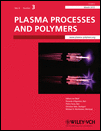
Plasma Processes and Polymers
Connecting Theory and Practice in Plasma PolymerizationPlasma Processes and Polymers is a leading peer-reviewed journal published by WILEY-V C H VERLAG GMBH, focusing on the innovative field of plasma science and polymer technology since its inception in 2004. With an ISSN of 1612-8850 and an E-ISSN of 1612-8869, this journal has established its reputation within the scientific community, holding a commendable Q2 ranking in both Condensed Matter Physics and Polymers and Plastics for 2023. Recognized for its rigorous standards and impactful contributions to the field, it ranks in the top 20% of the Physics and Astronomy category and top 26% of the Materials Science category, as per Scopus metrics. Catering to researchers, professionals, and students alike, the journal publishes cutting-edge articles that advance understanding and application of plasma processes in polymer science, thereby bridging theoretical insights with practical implications. While currently not offering open access, it provides a critical platform for advancing knowledge and fostering innovation, making it essential reading for those at the forefront of polymer research and applications.
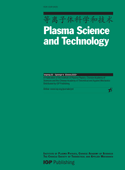
PLASMA SCIENCE & TECHNOLOGY
Illuminating the Dynamics of Plasma SciencePLASMA SCIENCE & TECHNOLOGY is a distinguished academic journal published by IOP Publishing Ltd, focusing on the realm of condensed matter physics. With its inception in 2000 and continuing through 2024, the journal serves as a vital platform for disseminating groundbreaking research and developments in plasma science, encompassing experimental and theoretical studies that advance our understanding of plasma behavior and its applications. Although the journal is not open access, its insights are invaluable for researchers, professionals, and students devoted to the intricate physics of plasmas, particularly given its respectable Q2 quartile ranking within its category as of 2023 and a notable Scopus rank that places it within the 44th percentile among its peers. Published from the United Kingdom, the journal aims to foster collaboration and innovation in this essential field of study.
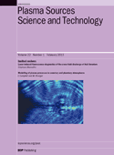
PLASMA SOURCES SCIENCE & TECHNOLOGY
Advancing the Frontiers of Plasma Science and Technology.PLASMA SOURCES SCIENCE & TECHNOLOGY is a premier academic journal published by IOP Publishing Ltd, focusing on the innovative field of plasma science and its applications in technology. Established in 1992, the journal has significantly contributed to advancing knowledge in this crucial area, maintaining a robust Q1 quartile ranking in Condensed Matter Physics as of 2023, which reflects its high-impact research dissemination. With an impressive Scopus ranking of 74 out of 434 in the field of Physics and Astronomy—specifically within Condensed Matter Physics—this journal stands out as a leading source for researchers and professionals dedicated to the study and application of plasma technologies. While it is not an Open Access journal, the published works are accessible through institutional subscriptions, making them available to a wide academic audience. The journal aims to provide a platform for significant contributions related to plasma physics, fostering scientific dialogue and collaboration across various disciplines. As it continues through its converged years up to 2024, PLASMA SOURCES SCIENCE & TECHNOLOGY remains essential for anyone involved in the burgeoning exploration of plasma-related scientific advancements.

PHYSICAL REVIEW LETTERS
Setting the Standard for Rigorous Physics ScholarshipPhysical Review Letters, published by the American Physical Society, is a premier journal in the field of Physics and Astronomy renowned for its rapid dissemination of high-impact research findings. With a distinguished history dating back to 1958 and an impressive ranking of #13 out of 243 in the general physics category, it stands proudly within the Q1 quartile, placing it in the top 6% of journals in its field. The journal focuses on brief reports of significant fundamental research across all areas of physics, making it an essential resource for researchers, professionals, and students seeking to stay at the forefront of developments in their field. Although Physical Review Letters does not offer open access options, its rigorous peer-review process ensures a high standard of quality and relevance in its published articles. With an unwavering commitment to advancing the understanding of physical science, this journal is indispensable for those looking to make a genuine impact in their research endeavors.
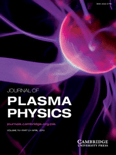
JOURNAL OF PLASMA PHYSICS
Pioneering insights in the realm of plasma physics.Welcome to the JOURNAL OF PLASMA PHYSICS, a premier publication dedicated to advancing understanding and research in the field of plasma physics. Published by Cambridge University Press, this journal has been a pivotal resource since its inception in 1967, supporting scholars and professionals engaged in the innovative exploration of plasma phenomena. With an impressive Q1 rating in Condensed Matter Physics, the journal not only holds a significant position in the academic community but also ranks within the top 50th percentile in the Scopus database. Although it currently does not offer open access, the journal provides a wealth of valuable research contributions aimed at fostering knowledge and collaboration among researchers, professionals, and students alike. The Journal of Plasma Physics is committed to publishing high-quality articles that push the boundaries of knowledge, ensuring its vital role in the ever-evolving landscape of physics research.

CHINESE PHYSICS LETTERS
Elevating Global Physics Discourse Since 1984Chinese Physics Letters is a prestigious journal published by IOP Publishing Ltd, based in the United Kingdom. Since its inception in 1984, the journal has served as a vital platform for disseminating impactful research in the field of physics, achieving a noteworthy Q1 ranking in the category of Physics and Astronomy (miscellaneous) as of 2023. Renowned for its rapid publication process, this journal is dedicated to providing a forum for high-quality, concise articles that address innovative theoretical and experimental findings relevant to both the academic community and industry practitioners. With an impressive Scopus rank of #52 out of 243, placing it in the 78th percentile, Chinese Physics Letters continues to influence the global physics landscape. Researchers, professionals, and students alike find this journal indispensable for staying abreast of the latest developments and trends in physics.

Nuclear Materials and Energy
Driving Progress in Nuclear Energy TechnologiesNuclear Materials and Energy is a premier open-access journal published by Elsevier, dedicated to the dynamic fields of nuclear science and materials engineering. Since its inception in 2015, the journal has made significant strides in disseminating cutting-edge research, establishing itself as a vital resource for researchers and professionals alike. With a commendable impact factor and ranked in the Q2 category for both Materials Science (miscellaneous) and Nuclear and High Energy Physics, and impressively in Q1 for Nuclear Energy and Engineering in 2023, Nuclear Materials and Energy stands out in the academic community. This journal aims to bridge the gap between fundamental research and practical applications, promoting innovative solutions in the efficient utilization of nuclear materials and energy technologies. Open access since 2015, the journal ensures wide dissemination and accessibility of crucial findings, making it an essential platform for advancing knowledge and fostering collaboration in these pivotal fields.

Plasma and Fusion Research
Unraveling the Mysteries of Fusion for a Sustainable TomorrowPlasma and Fusion Research is a pivotal journal within the realm of plasma science and nuclear fusion, published by the Japan Society of Plasma Science and Nuclear Fusion Research. With an ISSN of 1880-6821, this journal serves as a vital platform for disseminating significant research findings and advancements from Japan and around the globe. Operating since 2006, it has steadily contributed to the field, reflected in its recognition as a Q3 journal in Condensed Matter Physics for the year 2023 and its ranking of #383 out of 434 in the Scopus categories, placing it in the 11th percentile. Although it currently does not offer open access, the journal's commitment to quality research makes it essential reading for researchers, professionals, and students keen on exploring the complexities of plasma dynamics, fusion technology, and their applications in energy production. Situated in Nagoya, Japan, the journal fosters a collaborative environment aimed at pushing the boundaries of knowledge in plasma physics and enhancing the understanding of fusion processes.

INDIAN JOURNAL OF PHYSICS
Fostering Knowledge Exchange in the World of PhysicsINDIAN JOURNAL OF PHYSICS, published by the Indian Association for Cultivation of Science, serves as a pivotal platform for researchers and scholars in the field of physics and astronomy. With its ISSN 0973-1458 and E-ISSN 0974-9845, this journal is committed to presenting innovative research and developments across diverse topics in physics, covering both theoretical and experimental studies. The journal has made its mark in the academic community, evidenced by its classification in the Q3 category within the Physics and Astronomy domain as of 2023, and ranks #100 out of 243 in the Scopus curated database, placing it in the 59th percentile. Spanning from 2005 to 2024, the INDIAN JOURNAL OF PHYSICS aims to foster knowledge exchange and stimulate discussions among physicists and scientific enthusiasts. Whether you are a researcher looking to publish your findings, a professional seeking updates in your field, or a student eager to explore varying aspects of physics, this journal is an invaluable resource contributing significantly to the understanding and advancement of physics in India and beyond.